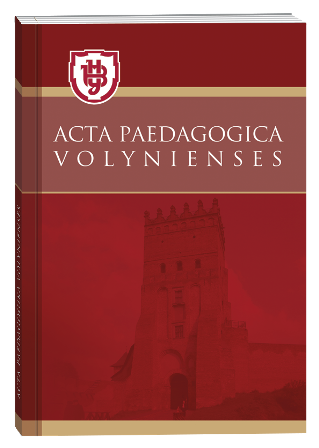DEVELOPMENT OF PRESCHOOLCHILD’S EMOTIONAL CULTURE IN THE PROCESS OF PLAY ACTIVITY
DOI:
https://doi.org/10.32782/apv/2025.3.2Keywords:
emotional culture, play activities, preschool children, interaction, teacherAbstract
The article is devoted to the problem of the development of the emotional culture of a preschooler in the process of game activity. It is determined that the formation and development of the emotional culture of children in the present conditions requires increased attention from the position of theoreticians and teachers-practitioners of modern education. Special attention is needed by modern children who form the «new generation of children of war». It is found that various aspects of the problem of the formation and development of the emotional culture of preschoolers in the process of game activity have been studied by many scientists and have their basis in the regulatory and legal framework of the education system of Ukraine. It is studied that the Basic Component of Preschool Education pays significant attention to the emotional development of the child and gives a prominent place in this to the educator. Since the game is the leading activity in preschool, it is advisable to organize work on the development of emotional culture precisely in the game activity of the child. Thus, the Basic Component of Preschool Education provides for the implementation of the educational component «Children’s Game» in preschool institutions and the formation of game competence in preschoolers. It has been proven that the most common type of games among preschoolers is plot-role-playing. In the process of game activity, children reflect social relations, as they duplicate the behavior of adults and their interaction with others. Such games are «Family», «Hospital», «Hairdresser», etc. However, in the context of martial law, children’s games, unfortunately, reproduce the situation prevailing in the country. The LEGO Foundation conducted a study of the themes of games of Ukrainian children during the war. According to their study, the most common plots are: «military pilot», «doctors in war», «air defense game», «blockades, document verification» and others. It has been determined that in the process of the game, the child is carried away by the role played and the process of the game itself and, thus, reveals his own emotions. But, since the educator is mostly a participant in such games, he is able to regulate the game process and contribute to the development of the child’s emotional culture in the process of game activity.
References
Про освіту : Закон України від 5 вересня 2017 р. № 2145-VІІІ / Верховна Рада України. URL: https://zakon.rada.gov.ua/laws/show/2145-19#Text (дата звернення: 24.06.2025).
Про дошкільну освіту : Закон України від 06 червня 2024 р. № 3788-ІХ / Верховна рада України. URL: https://zakon.rada.gov.ua/laws/show/3788-20#Text (дата звернення: 20.06.2025).
Базовий компонент дошкільної освіти. URL: https://mon.gov.ua/storage/app/media/rizne/2021/12.01/Pro_novu_redaktsiyu%20Bazovoho%20komponenta%20doshkilnoyi%20osvity.pdf (дата звернення 22.06.2025).
Груша Л.О. Педагогічні умови виховання емоційної культури дітей молодшого шкільного віку : дис. … канд. пед. наук : 13.00.07. Київ, 2009. 225 с.
Агіляр Туклер В. В. Виховання ініціативності дітей у ігровій діяльності: сучасний стан. Вісник Університету імені Альфреда Нобеля. Серія : Педагогіка і психологія. 2017. № 1. С. 80–85.
Завязун Т. В. Проблема розвитку структурних компонентів мовлення старших дошкільників у грі: сучасні підходи дослідження. URL: http://www.appsychology.org.ua/data/jrn/v4/i15/6.pdf (дата звернення 25.06.2025).








